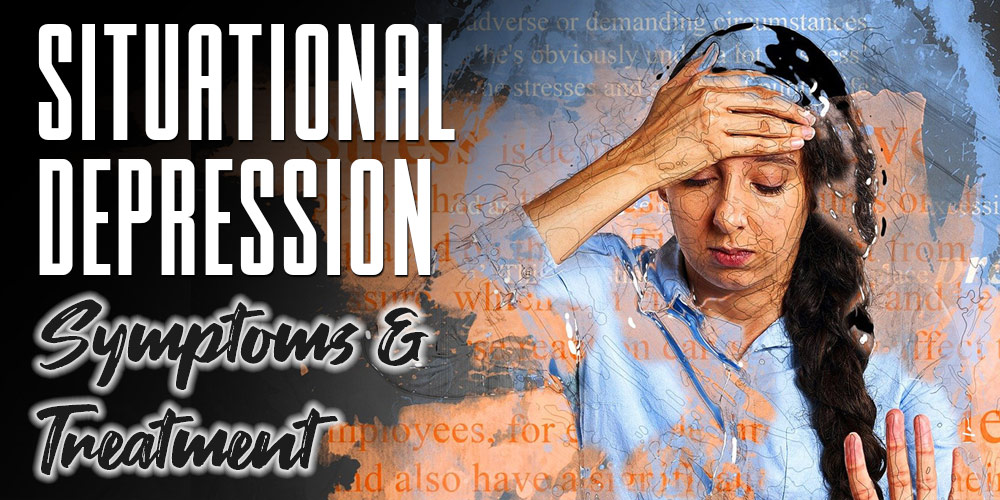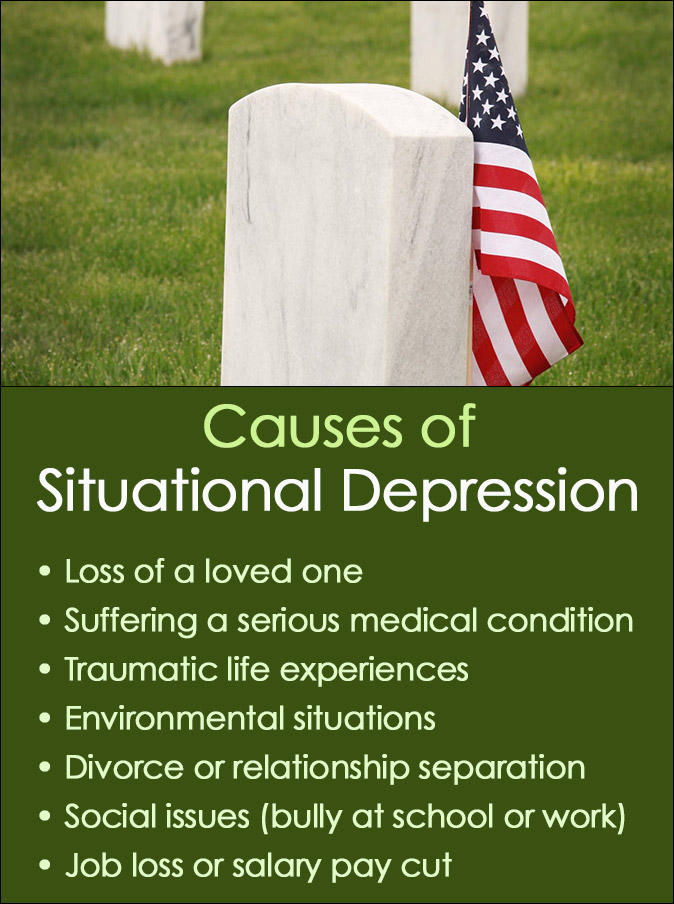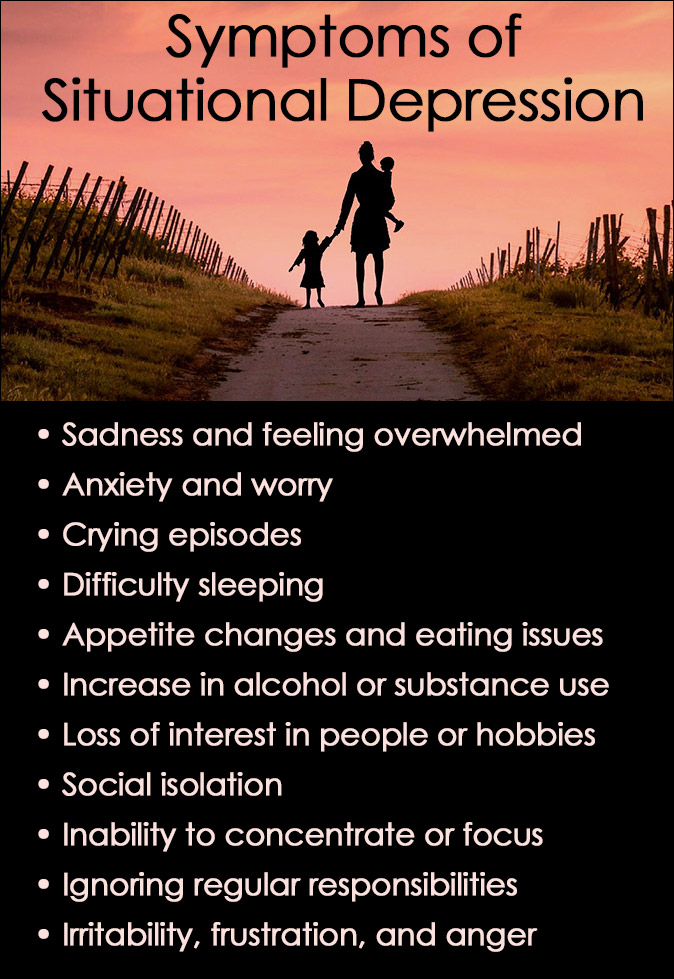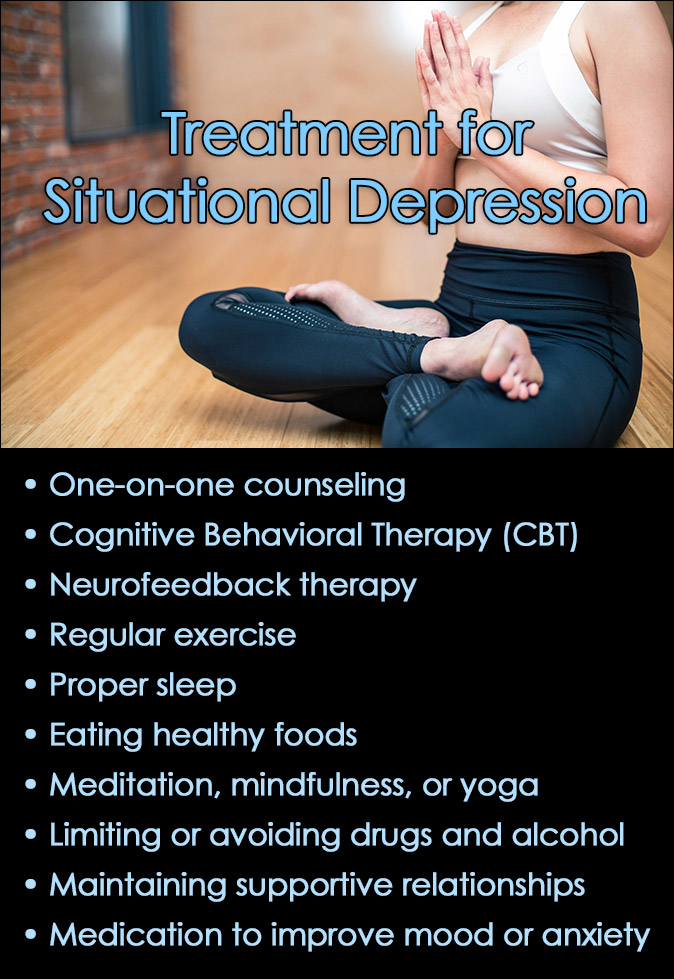
Life has a way of throwing unexpected curveballs at us that cause stress, anxiety, and sometimes something more serious like situational depression.
Really, the only prediction we can make about life is that it is unpredictable. There’s no escaping the surprise twists and turns that come at us from all angles.
As adults, we tend to understand this concept, but it doesn’t necessarily mean this unexpected stress just rolls right off our backs. In fact, there are all kinds of events in life, both positive and negative, that can lead to situational depression.
What is Situational Depression?
Situational depression is considered an adjustment disorder, which is a type of short-term depression associated with stressful life events.
Situational depression is defined as, “a short-term condition triggered by a specific stressful or traumatic event.”
Even though this form of stress is temporary, it can still cause substantial feelings of fear and worry that affect our day-to-day behavior and have a negative impact on our mental health.
This type of depression is a lot more common and serious than most people realize.
An excellent example of widespread situational depression is the 2020 COVID-19 pandemic.
In late June 2020, the Centers for Disease Control and Prevention (CDC) reported that 40 percent of U.S. adults experienced increased symptoms of poor mental health and substance abuse related to the stress of the pandemic.
Of this group, 11 percent of people admitted seriously considering suicide.
To be clear, though, it doesn’t take something as big as a global pandemic to cause situational depression. Any stressful life event, whether we consider it big or small can take a toll on our mental health if we don’t address it.

What Causes Situational Depression?
Tragic events like the sudden loss of a loved one is a common cause of situational depression.
On the opposite end of the spectrum, a sought-after work promotion or a new job with enormous responsibilities can also cause significant stress, even though it is something we ultimately wanted.
Whatever the situation, it is the added pressure and temporary stress that can cause situational depression.
Common life events that carry a lot of stress include:
- Suffering from a serious medical condition or taking care of a loved one in this position
- Traumatic life experiences, such as physical or sexual assault or a devastating natural disaster
- Environmental situations, like living in an unsafe community or fleeing a war-torn region
- Divorce, separation, or other relationship issues
- Social issues, like a bully at school or work
- Loss of a job or a pay cut in salary
The list could go on and on. It’s important to remember that while one person might not consider a particular situation stressful, another might have an entirely different, negative reaction it.
In these types of circumstances, a person might have other stressful events going on in their life that compounds the issue. Perhaps they are already struggling with poor mental health and the added pressure tips them into this type of depression.
Understanding the symptoms of situational depression is useful for personally identifying the condition, but also for supporting others that might be dealing with life’s stressors.

What are the Symptoms of Situational Depression?
Even though the condition is short-term, it doesn’t make situational depression symptoms any less pleasant.
Depression can affect every aspect of a person’s life and may even make getting out of bed difficult and painful.
The symptoms of situational depression include:
- Hopelessness, sadness, and feeling constantly overwhelmed
- Prolonged feelings of anxiety and worry
- Crying episodes
- Difficulty sleeping
- Appetite changes and eating issues
- Increase in alcohol or substance use
- A loss of interest in people or hobbies once enjoyed
- Social isolation
- An inability to concentrate or focus
- Ignoring normal work or home-related responsibilities
- Irritability, frustration, and anger
- Anhedonia or inability to experience joy
There is absolutely no shame in battling these symptoms. What’s important is to seek help when they occur.
Even if situational depression is temporary, getting proper treatment may actually speed the healing process and give a person the necessary tools to cope with the impact of a troubling life event.
How is Situational Depression Treated?
Seeking treatment for situational depression can help us understand and approach whatever particular problem is creating so much unhealthy stress.
One-on-one counseling or psychotherapy is effective for treating situational depression.
A therapist might suggest antidepressant medications, such as selective serotonin uptake inhibitors (SSRIs), in addition to counseling.
Behavioral approaches, like Cognitive Behavioral Therapy (CBT), are useful tools for combatting unavoidable stressors.
Neurofeedback Therapy has also shown to be helpful for people with many forms of depression, and this Neurofeedback Cheat Sheet gives a summary of how it works.

Lastly, living a healthy life goes a long way toward reducing the symptoms of situational depression.
Healthy life habits include:
- Limiting or avoiding drugs and alcohol
- Regular exercise for at least 30 minutes a day, 4 or 5 days a week to boost happy hormones in the brain
- Maintaining a healthy diet of lean proteins, fish, fresh fruits and vegetables, and whole grains
- Getting 7 to 9 hours of restful sleep every night
- Fostering and maintaining supportive relationships with other likeminded people
- Practicing meditation, mindfulness, or yoga to calm the mind and reduce stress
It’s virtually impossible to avoid all forms of stress. However, acknowledging that we might be going through a difficult patch and taking the steps needed to get better will help move us through a trying time in a much healthier way.
Avoiding Other Types of Depression
While situational depression is often short-lived, it can turn into a more severe form of depression if not addressed in the early stages.
It is never recommended to self-medicate with drugs or alcohol, as this is a common driver of major depressive disorders that require other forms of treatment.
Using alcohol or other substances as a quick fix might briefly make a person feel better. But in the long run, it can lead to addiction or a co-occurring disorder of addiction combined with depression, requiring dual diagnosis treatment for recovery.
Trying to recover from depression and addiction together is much more difficult than only working on one of the issues by itself.
This is why it’s essential to seek help for situational depression at the first signs that it is becoming too much to handle alone.
Frequently Asked Questions
Is situational depression a diagnosis?
Yes, situational depression is a recognized medical diagnosis, also known as “adjustment disorder with depressed mood.”
It is generally caused by a specific stressful or traumatic event and the symptoms occur within three months of the triggering event.
According to the DSM-5, the symptoms develop within three months of a specific stressor, they are more severe than normally expected from such an event, they do not meet the criteria for another mental disorder, and they are not related to a pre-existing condition.
How long does situational depression last?
Situational depression is typically a short-term condition, and the duration varies depending on the type of triggering event, an individual’s use of coping strategies, and their personal or social support systems.
The symptoms generally last for a few weeks but may continue for approximately six months. An individual usually sees an improvement after an adjustment period to the stressful event or by using effective coping strategies.
Depending on the nature of the stressor, it’s possible to have a longer duration for certain events that are ongoing or if the individual lacks emotional support during the depressive period.
If the symptoms persist or they have a negative impact on daily functioning, it might be necessary to seek professional help to avoid it escalating into clinical depression.
What is the difference between clinical depression vs situational depression?
Situational depression is triggered by a specific event and usually has a short duration, while clinical depression is not related to simply one type of circumstance with more severe and longer lasting symptoms.
Situational Depression
- Known as adjustment disorder with depressed mood
- Short-term condition caused by a specific stressful or traumatic event
- Triggered by life events such as divorce, job loss, or the death of a loved one
- Symptoms disappear when the individual adapts to the stressor, or it is no longer an issue
- Treatment usually includes psychotherapy and lifestyle changes
Clinical Depression
- Known as major depressive disorder
- Chronic mental health condition that can occur with or without an identifiable stressor
- Can be caused by genetic, biological, environmental, or psychological factors
- Symptoms last for at least two weeks and may continue for months or years if not treated
- Treatment often includes a combination of psychotherapy and antidepressant medications
Can situational depression lead to clinical depression?
Yes, situational depression can lead to clinical depression if it is left untreated and the symptoms persist.
This can occur if a person is exposed to prolonged stress and the triggering event is not resolved.
Other factors that may lead to clinical or major depressive disorder include a genetic predisposition to depression, biological factors, a lack of effective coping strategies, and insufficient support systems to help mitigate the symptoms and stressors.
Seeking treatment at the first sign that depression symptoms are impacting daily life will reduce the chance that situational depression advances to clinical depression.
Is there a specific situational depression medication that is normally prescribed?
No, there is not a specific medication that is prescribed to treat situational depression. In fact, the symptoms will usually go away on their own within a few weeks to six months.
Treatment is often successful with psychotherapy such as Cognitive Behavioral Therapy, and lifestyle changes like exercise, proper sleep, and meditation or mindfulness relaxation techniques.
If medication is necessary, SSRIs such as Zoloft, Prozac, Lexapro, or Celexa can be helpful for improving mood.
For treating acute anxiety symptoms related to situational depression, Xanax, Valium, or Ativan may be prescribed, but they should only be used for a short time because they can be addictive and cause other negative health issues.
Related Posts
- High Functioning Depression Symptoms and Treatment
High Functioning Depression is sometimes called "Functional Depression," but is formally known as “Persistent Depressive…
- Psilocybin Therapy for Depression Treatment and Mental Health
The push to find new and effective treatment approaches for mental health issues like Psilocybin…
- Seasonal Depression Symptoms and Treatment
Fall and winter seasons can be beautiful as trees shed their leaves and cold temperatures…
